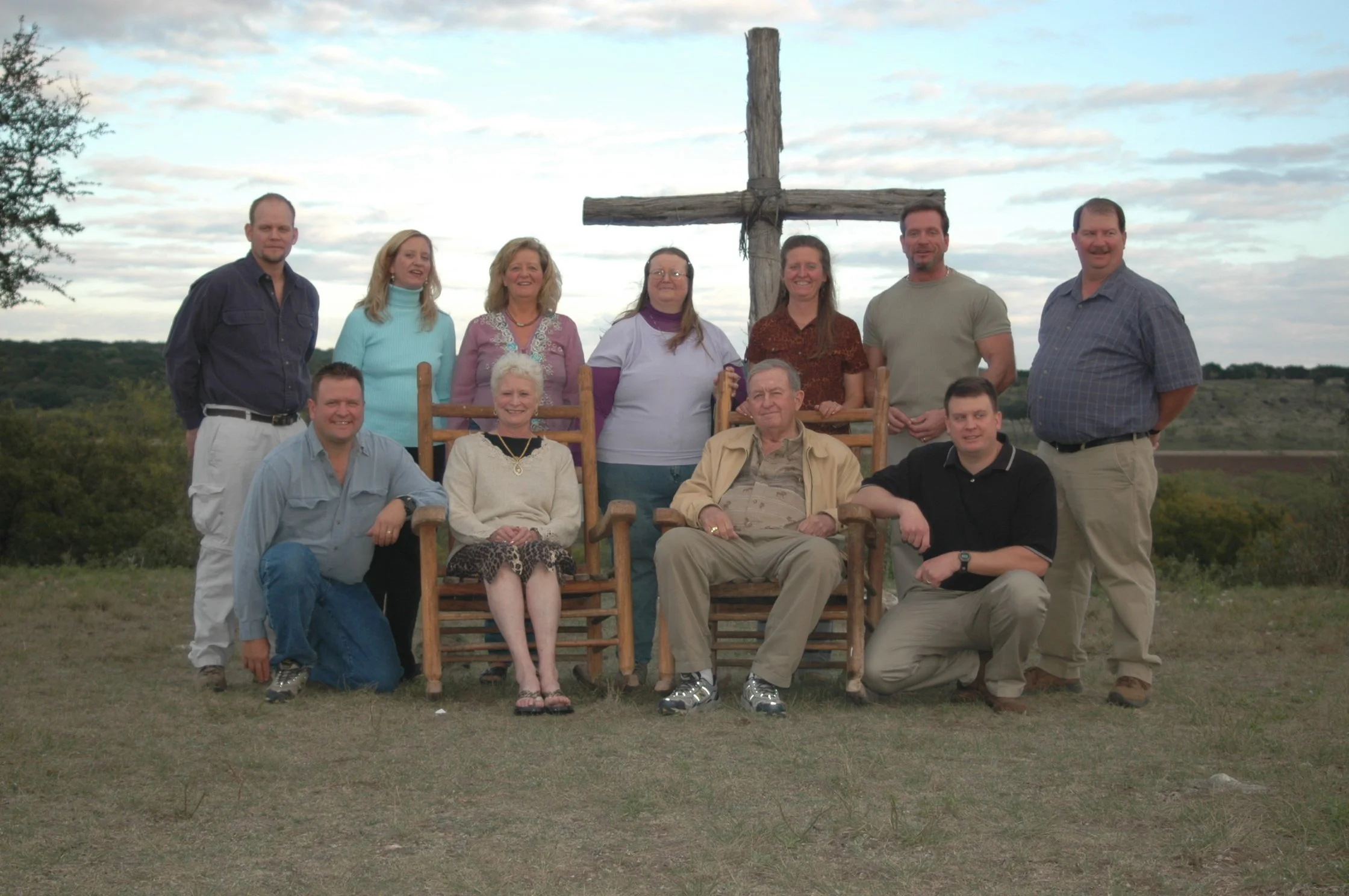Cabela History Chapter 3: "The First Step"
"The First Step"
By David Cabela
“The human heart plans the way, but the Lord directs the steps.”
PROVERBS 16:9
The third short story from David Cabela in our "Family History" series. These short stories are meant to take readers into the Cabela Family history from his perspective...
“Dick had this positive, never-quit attitude and a belief that anything could be accomplished with determination and hard work,” Mary said. “It was irresistible. We shared a desire for a big family, a love of the outdoors, and a devotion to faith. Some people are made for each other. I believe that. And some of us are lucky enough to meet early in life.”
Dick and Mary married in 1955 and had their first child, Nancy, the following year. By 1961, they had three more children: Geri, Teri, and Rich.
Twenty-five years-old at the time, Dick made his living as manager of his father’s furniture and hardware store. As much as he appreciated the opportunity his father gave him, Dick’s passion steered him in other directions. He wanted to branch out on his own, to build a life and a career that reflected who he was. He understood the life of someone who sold goods. “My father was a merchant. My grandfather was a merchant. It’s what I knew,” he once said.
But his heart was just not into furniture and hardware—he was an angler and a hunter. He understood people who hunted and fished. He shared their infatuation for wild lands and the creatures that live there. And he realized that kind of passion had to be fueled with proper gear.
At the time, few companies that sold quality outdoor gear at good prices existed for someone from a rural community like Chappell, Nebraska. The local bait shop had some hooks and bobbers, maybe an odd pole, but you had to purchase your rifle or bow in one of the bigger towns down the highway. And if you wanted any kind of selection, you had to drive to Denver, Cheyenne, or Omaha. It was not practical for people living in rural America to get to cities very often. Dick knew a market existed—he just did not know how to tap into it yet. But like a hunter glassing the hills for movement, he kept his mind and eyes open for an idea or an opportunity.
So, in January of 1961, as Dick and A.C. fought a blinding snowstorm on ice-covered highways during a trip to the annual furniture and housewares shows in Kansas City and then to Chicago, he decided to keep a look out for more than the usual furniture-related items. He did not expect to find much, but in the big, bustling cities, companies made and sold almost everything.
Kansas City turned up nothing out of the ordinary. Same old furniture, some new styles, a softer cushion, less wood, everything they had expected. They made a few purchases, keying in on the tastes and wallets of the farmers, ranchers, and tradespeople of Chappell. After all, who better to understand those preferences than a couple of people who shared them? Dick could tap into the more contemporary tastes of young families while A.C. knew quality, durability, and price mattered more than appearance to his peers. If they ever disagreed, A.C.’s vote overruled Dick’s every time.
After shopping at the Chicago Furniture Mart and the Merchandise Mart, they ventured to the Navy Pier Housewares Show where Dick believed he had discovered the jewel he had been looking for. In a far-back corner of the show, a small booth with a lonely vendor seemed to sparkle just a little—just enough for a budding entrepreneur to take a closer look.
A small sign behind the lone person in the booth read, “Walker International.” Of the few bins, one, marked Hand-Tied Flies, full of feather- covered hooks seemed too good to be true. Though he had only tried fly-fishing once or twice with results not even worthy of a fish lie, he had spent some time fishing in Wyoming’s Powder River and the Miracle Mile of the North Platte River. He saw fly-fishermen, sometimes shoulder-to-shoulder during a hatch. He saw how they cared for their flies, how they selected them from their boxes as if picking out an engagement ring. People who took their sport that seriously needed gear. And not everybody had the time to tie their own flies.
“$2.25 per gross.”
How could he miss?
He found A.C. haggling in a booth selling rain gauges and gardening tools. He hated to interrupt, but if they didn’t jump on the deal somebody else would.
His father almost laughed at him. Fishing flies? In Chappell? Never work. But A.C. knew shielding his son from failure did him no good in the long run. He entrusted his boy to purchase forty-five dollars worth of goods to resale all on his own.
Dick took the whole wad and bought twenty gross. He knew a market existed for the flies and planned to prove it to his father.
Back in Chappell, Dick made up a sign, put the flies in a prominent display box, and waited for the anglers to come through the door. For the first couple of weeks, he dusted them off, rearranged the display, made a bigger sign. Three months later, they were covered in a layer of dust and shoved behind better selling items like coffee pots and replacement door knobs. Doubt crept in like a snake stalking a mouse. But he had already made the investment. He knew anglers would pay a fair price for quality gear. He knew because he was an angler and he would. He had to prove to his father that he could sell them. He had to prove it to himself. An idea struck him one day while perusing a copy of Field and Stream at Wieland’s Drugstore where he often sat drinking his morning coffee. He thumbed through the magazine, weighing the promises of different titles against one another. Just when he thought he had decided on an article, he stopped flipping pages and pressed the magazine flat on the table. An entire page of ads popped off the paper.
LIVE BAIT!
HUNTING KNIVES!
LAB PUPPIES!
Why not? If consumers purchased live worms through the mail, why not hand-tied fishing flies? It was worth a shot. When he learned how much ad space cost in Field and Stream, he shelved the idea while devising ways to come up with the needed cash.
Then, during an early summer fishing trip to the Hole-in-the-Wall Gang Canyon on Wyoming’s Powder River Basin, Dick noticed a number of anglers. He saw them catch more fish than him. He watched them reel in bigger fish. And he noticed most of them had better gear, noting in particular how many fly fishermen with their fancy hats and long rods stalked the waters. Those were the anglers he needed to reach.
Later, fishing the Miracle Mile of the North Platte River below Pathfinder Dam, he encountered more fly fishermen. He noticed how many of them spent a great deal of time fingering through their metallic fly boxes, searching for the day’s perfect imitation. These folks would buy his flies—he knew it. He thought about the anglers he knew in Chappell, Nebraska, about the men and women he had seen at the local ponds or down on Lodgepole Creek. Only once did he remember a fly fisherman—and that gentlemen had looked like an outsider. Dick realized that without a different plan his flies might sit in the hardware store for ten years gathering dust.
With direct visual evidence of a possible customer base, he needed to find a way to reach the anglers of Wyoming.
“I’m thinking about starting my own business,” he said to Mary during the drive home.
“What kind of business?” Chappell didn’t have much need for another retail establishment. Besides, anything he might try to sell would probably compete directly with his father’s place. He wasn’t thinking about moving was he? Mary wondered.
“A fishing business,” he said.
“In Chappell?”
“I’ll use space ads and mail them. It will have to be part-time. I’ll have to work from home after the store closes.”
“You think people will buy them?” Mary asked. She trusted Dick’s judgement, but was trying to wrap her mind around people purchasing fishing gear from Chappell, Nebraska.
“Not if I don’t try,” Dick said.
Dick purchased the flies from the furniture store and, in doing so, became an entrepreneur. He and Mary took Cabela’s first stocked merchandise and stuffed them between the sugar sack and the cornflakes box in the pantry. Soon after that, Dick placed his first ad in the Casper Tribune offering twelve hand-tied flies for one dollar.
They received a single order from Mrs. Ernest Lindahl. One. Single. Order. He had sold exactly zero flies in the furniture store and one order in a Wyoming paper. If he did not want to be stuck with thousands of flies in his personal tackle box, he would have to do better. Yet, one was better than none. In fact, Dick saw this single purchase as a 100 percent growth in sales. It was an order. It was success. Before you build a fence, you have to dig a hole for the first post and that first hole starts with a single shovel of dirt. One order was a start, not an end.
Dick Cabela believed in taking baby steps. He believed in being methodical while giving everything he had to any given task. It helped to mitigate the effects of the inevitable failures, but it also required the courage to take that first step with boldness. Very little can be accomplished without the courage to start and the conviction to follow through with the required effort. It also takes a trust that sometimes does not come easy—especially when obstacles and defeat are strung across your path and trip you up. It takes trust in yourself, trust in others, and, for Dick and Mary a deep trust that no matter what happened God was ultimately in charge.

